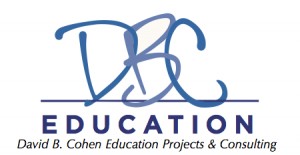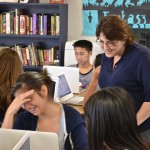A slight variation on the school visit post today – I’m exhausted and have two visits to blog about. There’s so much more I’d like to say about these two fantabulous teachers, but I’ll keep it brief to make a point. Please don’t infer from the contrast that either of these teachers lacks the strengths I describe in the other. I’m just sharing dominant impressions that illustrate a key idea in this project.
Date: 10/7/14
School (District, City): Luther Burbank Middle School (Burbank Unified, Burbank, CA).
Teacher, Class: Rebecca Mieliwocki, 7th grade English
.
Date: 10/8/14
School (District, City): Jefferson Middle School (San Gabriel Unified School District, San Gabriel, CA).
Teacher, Class: Heather Wolpert-Gawron, 8th grade English, and Speech
Both of these teachers have national reputations in the field. Rebecca was the National Teacher of the Year in 2012. Heather has been a teacher of the year multiple time at local levels, and has written blogs, articles, and books about teaching. If they taught in my local middle school, I’d be thrilled to have either of them teaching my kids. I saw both of them deliver effective lessons that engaged kids, fit into a logical and useful sequence of instruction that would be useful, age appropriate, standards-based. And yet, the run their classrooms quite differently. Part of the difference might be explained by differences in facilities, furniture, and access to technology, but I think most of the difference comes down to personality, and I would argue that both personality types serve students well.
Rebecca struck me a highly effective manager. With thirty students buzzing around the classroom with varied roles in group presentations, Rebecca was able to keep track of individual students, their work, their roles, their needs – and without written aides to help memory. She also constantly attended to the orderliness of the classroom, constantly picking up a loose item here or there, straightening desks and pushing in chairs to facilitate everyone’s movement in the classroom. At the end of one lesson she spotted a scrap of red paper that should have been thrown away, and was able to recall which student was using that paper in that location for what purpose, half an hour earlier, amidst the activity of the whole class.
As for Heather, her teaching personality is completely and authentically Heather. She’s a performer, a mimic, a humorist. She knows her students and they clearly know her well too, so that when she makes a Lord of the Rings reference, some students say “of course!” as if she makes at least one such reference per class. The items in her room have joke names: the smart board is Albus DumbleBoard, the laptop cart is Kart-niss Everdeen, and the front door is MorDoor. When she needs the class to listen up for a moment, she gets their attention back from group conversations by saying, loudly, “Don’t listen to this! It’s a private conversation, do you mind? I’m just trying to tell Brian that you have to put this document in the correct folder in order to share it with me.” Sometimes she speaks in a character voice, and suddenly you’d think there’s a little old lady from Brooklyn in the room. Knowing Heather for many years outside the classroom, I saw her classroom persona as a perfectly natural extension of her personality.
So, again, don’t get me wrong: Rebecca is charismatic and Heather is an effective manager. But the dominant impressions and “vibes” in the classroom are different. What are we to make of this? How many different ways are there to be an excellent teacher?
The National Board for Professional Teaching Standards has five core propositions regarding accomplished teaching.
- Teachers are committed to students and their learning.
- Teachers know the subjects they teach and how to teach those subjects to students.
- Teachers are responsible for managing and monitoring student learning.
- Teachers think systematically about their practice and learn from experience.
- Teachers are members of learning communities.
If you look at those propositions and look at Rebecca and Heather, they are clearly highly accomplished practitioners. I think it’s important to focus on these core ideas if we want to look at spreading good teaching, but also embrace the variability among skilled and creative practitioners working in a profession that depends so much on personal connections and relationships.
To support my travels and writing, I’m running a Kickstarter campaign through October 22, 2014. Please take a look at the campaign page and video, and consider a pledge that will support the work and also allow me to send you the book I’ll be writing next year!


